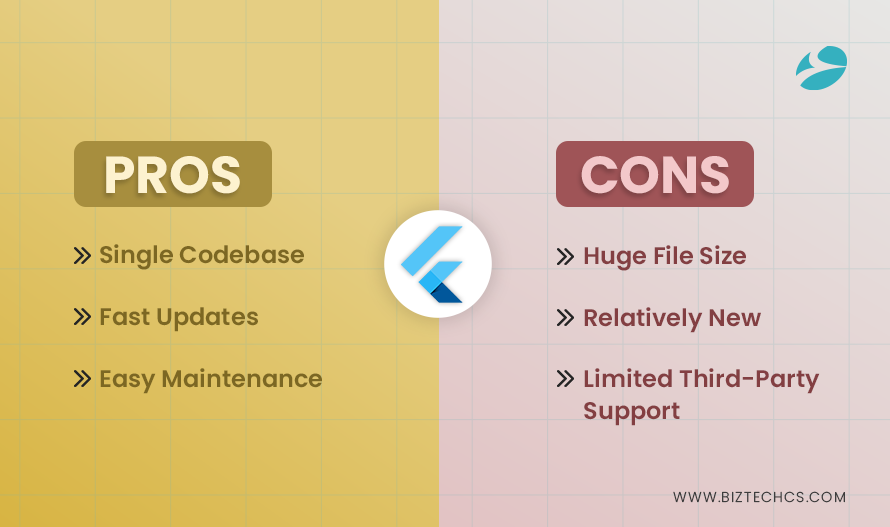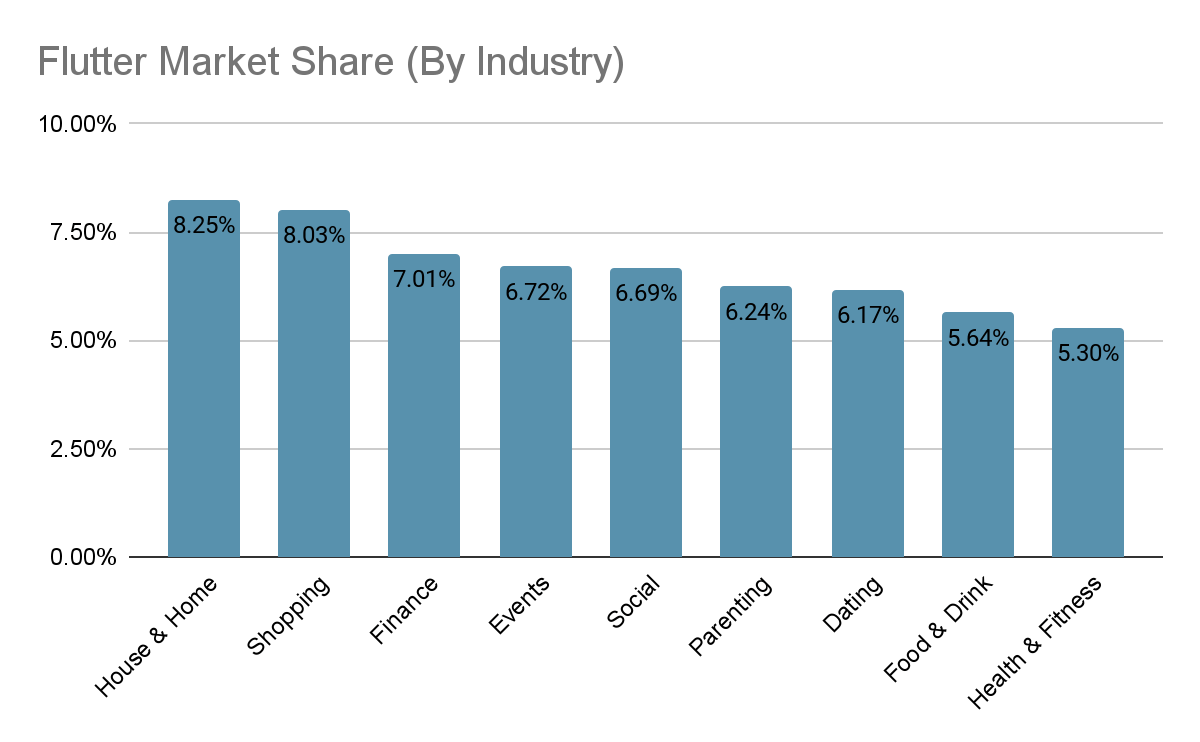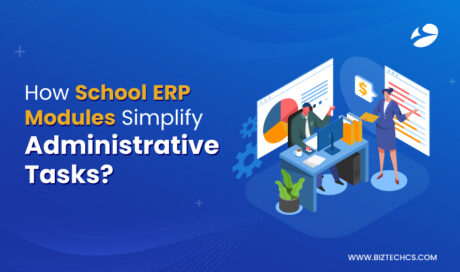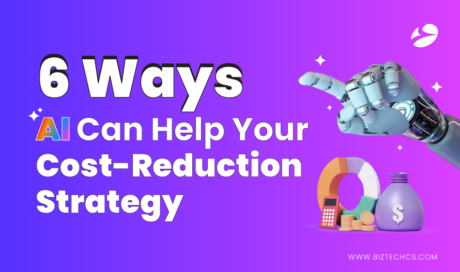2146
Pros and Cons of Flutter SDK: Is It Good for Your Mobile App?
23 Dec, 2022
5 min read
2146
23 Dec, 2022
5 min read
Table of content

Cross-platform mobile apps have become the most popular these days, more so for reasons like cost-efficiency and the use of a single codebase. And, Flutter has become a recognizable name for developing cross-platform apps within a short span of 5 years.
However, there are plenty of other technologies available for cross-platform app development. So, what makes Flutter unique? Why should you choose it for app development?
Here, look at the various Flutter pros and cons to determine what’s best for you!
Flutter is an open-source software development kit (SDK) developed and released by Google in May 2017. You can use a single codebase to develop applications for 6 different operating systems such as Windows, iOS, Android, macOS, Linux, and Google Fuchsia.
It uses Dart programming language alongside C and C++ for development. Developed and backed by Google, it has a large growing community of developers.
Here are some popular apps made with Flutter – Reflectly, Xianyu, Groupon, eBay Motors, Hamilton, Google Ads, Cryptograph, Pairing, Watermaniac, KlasterMe, etc.
Flutter in 2023: Statistics

So, if you ask is Flutter good for app development in 2023? I would say yes because it is too popular to answer otherwise.
Based on the year-on-year growth of Flutter as an app development framework, it is evident that the SDK has more to offer. In fact, the new Flutter 3 comes with a casual games toolkit. The starter kit mentions best practices and has templates for you to choose from, alongside credit for cloud services and ads.
With that, it is stepping into a new industry of casual mobile games. Furthermore, the launch of Flutter 3.3 in August 2022 included many performance, package, and rending layer upgrades. All of it improved and solidified Flutter as a competent software development kit.
Looking at the steady rise in its performance, Flutter SDK is likely to add more interesting features in 2023 with its frequent updates. It is here to stay and can change the way you develop apps!
However, there are plenty of Flutter pros and cons in 2022 to check out before you decide if it is the best platform for your mobile app.
So, let’s check!
Flutter adresses one of the main concerns of app owners, i.e., creating the same app separately for multiple platforms. If you want to build an app that works seamlessly on multiple platforms, then Flutter is the technology for you.
With Flutter SDK, you can write code once and deploy everywhere. It saves time and is cost-effective. Moreover, it supports all 6 operating systems – iOS, Android, Windows, macOS, Linux, and Google.
If you have had any development experience, you would know how you had to reboot the entire app to see the changes you just made? Well, Flutter has officially addressed this problem. The hot reload feature in Flutter development environment ensures that you can see all the changes you make in code are in real time.
This feature saves a ton of developer’s time as they can quickly check what’s working for them and what needs to be changed and rework on that. Whether it is changing font or color of text, or increasing/decresing the size of buttons, you can check it quickly.
It is especially useful when design and development teams work in sync to decide on the app user interface.
If you are wondering ‘is flutter open source or not’, the answer is yes. Meaning, you can download Flutter’s codebase easily without having to pay any cost. The open-source community further contributes significantly to many new features.
You can also contribute or seek help from the huge community of developers on any critical development issues. It makes development much easier and faster.
One of the significant reasons to choose Flutter for app development is the availability of customizable widgets. Like React Native is component-based, Flutter relies heavily on widgets.
From app layout to text, buttons, and color options, everything is a widget. It makes customization much easier for developers and improves the time to market as well. Quick development makes Flutter apt for developing minimum viable products (MVPs).
Flutter is built using Dart. So, if you want to develop applications using Flutter, all you need to learn is Dart. It is an object-oriented, strongly typed programming language with sound null safety feature.
It supports AOT (ahead of time) and JIT (Just in time) compilation for codes. With JIT compilation, you can enjoy the hot reload feature. And with AOT compilation, you can develop applications much faster as the compiled code is converted to native ARM machine code.
Dart is well-structured and very easy as a programming language. So, if you are familiar with languages like C, C++, Java, you can seamlessly start working with Dart by learning a little.
After the release of Flutter 3.0, it is clear that the platform extends stabilised support for desktop and web. You can not only build mobile apps but Flutter web apps and Flutter desktop apps conveniently.
Thus, if your target audience uses web or desktop, you can easily build apps for catered audience. For more information of Flutter on web and Flutter on desktop, check the official site.
DevTools are a dedicated suite of tools for helping you develop and test applications more seamlessly. It includes code formatter, Hot reload, widget inspector, and many more tools to help your development and testing processes. It ensures developers don’t have to spend too much time coding everything from the ground up.
Flutter is a well-documented app framework. The simple format makes it easier for developers to understand the various features seamlessly and work with it. While Flutter is well kept by the Google team, its other competitors like React native do not have such elaborate documentation. It is one of the Flutter vs React native key differences.
Besides custom widgets, there’s another way you can create impeccable user interface for your Flutter apps. You can use FlutterFlow visual app builder on top of your Flutter applications to create engaging user interface and user experience.
The tool comes with a simple interface that can be used to drag and drop elements and create unique user interfaces as needed. However, it isn’t open-source and comes with a cost.
Since most of the codebase is common for multiple platforms, it is also easier for developers to maintain the applications. If there is an error, they can simply rectify it and apply the same for all apps. It also makes the process of sending updates much easier and cost effective.
Quality development is attained only through stringent testing processes. And Flutter does wonders in terms of testing with its effortless support for unit testing, integration testing, and widget testing. It is easier to detect errors and resolve them.
Since Flutter utilizes in-built widgets in place of platform widgets, the developed app size is often quite large. It can affect your revenue or number of app downloads as users tend to not download it. Users may not prefer it as the app would consume more space in their phone and would take longer to download.
However, this problem can be solved by removing unused resources, using specific packages and libraries, or by asset compression.
Despite the achievements it has gained ever since its release, it is stil considered as an emerging technology. It is clear that the platform has potential to grow in terms of number of packages and plugins.
However, it is not quite there yet. There’s limited learning documents and the small Dart community doesn’t help much here. So, if you are looking for a full-grown app development framework, Flutter might not be the first one to come to your mind.
Whether you develop apps for web or mobile, third-party libraries or applications are a crucial part of it. These libraries can improve your app’s performance quickly and significantly without the need for developer to code everything from scratch.
Flutter doesn’t provide much third-party support as it is still new and emerging. Though Flutter was initially released in 2017, its first stable version came on December 4, 2018. So, there are very few number of plugins and packages for Flutter continuous integration. As of now, there are about 26k packages for developing Flutter applications, and it is growing continually.
Now that you have seen pros and cons of Flutter, you should be able to decide if Flutter is really the best option for you. So, should you use Flutter for your projects? Here, look at the various occasions when Flutter development is most suitable.
So, here’s the answer to what is Flutter used for:
This should help you understand when Flutter would be the ideal choice for your project. So when you have decided, it is suitable to follow Flutter best practices and build robust applications as per your requirement.
In this pursuit, you can also hire Flutter Developers so they can assist you in the app development process. If you are looking for skilled professionals who can help you with Flutter app development, BiztechCS can be of great help.
We are a professional Flutter development company and are aware of the latest trends and techniques to guide you in development. Connect with our team today to get started!
Flutter is an emerging technology and has gained quite a lot of popularity in the past few years. Here, you can see all of such progresses, flutter examples, features, advantages, and disadvantages to determine if it is the right fit for you.
However, it comes down to your unique requirements. So, you have to decide based on your requirements in addition to the pros and cons. Furthermore, you have to hire Flutter experienced developers to leverage the most out of this open-source platform.

Development
ERP
Odoo
60
By Devik Gondaliya
22 Oct, 2024

Fabric.js
209
By Biztech
17 Oct, 2024

Artificial Intelligence (AI)
Development
542
By Devik Gondaliya
11 Oct, 2024